
One of the many feelings I had after finishing Nick Triplow’s superb account of the life and writing of Ted Lewis was that it was all such a long time ago. The crucial decade from 1970 to 1980 just seems – and there is no other phrase that fits – like another country. A summary, then, for people who may not even have been born when Lewis was writing. Ted Lewis was born in 1940 in Manchester. After the war he and his parents moved to Barton on Humber, in North Lincolnshire. On leaving school, Lewis, a talented artist, traveled every day across the River Humber to art school in Hull. After graduating, Lewis found work further south with various advertising agencies, but his abiding passion was his writing. As well as enjoying a drink, however, Lewis was a serial womaniser. Lewis’s old Barton friend, Mike Shucksmith, recalls that the writer had a way with women.
“There was something about him that snapped their knicker elastic. I couldn’t see it, but whatever it was, he had it.”
 In 1965, All the Way Home and All the Night Through was published. It is a thinly disguised autobiographical novel, but Lewis’s breakthrough came in 1970 with the publication of Jack’s Return Home. The title was, bizarrely, taken from a spoof melodrama acted out by Tony Hancock, Hattie Jacques, Sid James and Bill Kerr as an episode of Hancock’s Half Hour. The novel, however, has few laughs. It describes the revenge mission of a London-based enforcer, Jack Carter, as he returns to his northern home town to investigate the death of his brother. The novel was adapted and filmed as Get Carter, and the rest, as they say, is history. Fame – and money – did not sit comfortably on Lewis’s shoulders, however. A mixture of drink and personal demons led to the break-up of his marriage, and a solitary return to Barton to live with his widowed mother. He died there, of heart failure connected to his ruinous drinking, in 1982.
In 1965, All the Way Home and All the Night Through was published. It is a thinly disguised autobiographical novel, but Lewis’s breakthrough came in 1970 with the publication of Jack’s Return Home. The title was, bizarrely, taken from a spoof melodrama acted out by Tony Hancock, Hattie Jacques, Sid James and Bill Kerr as an episode of Hancock’s Half Hour. The novel, however, has few laughs. It describes the revenge mission of a London-based enforcer, Jack Carter, as he returns to his northern home town to investigate the death of his brother. The novel was adapted and filmed as Get Carter, and the rest, as they say, is history. Fame – and money – did not sit comfortably on Lewis’s shoulders, however. A mixture of drink and personal demons led to the break-up of his marriage, and a solitary return to Barton to live with his widowed mother. He died there, of heart failure connected to his ruinous drinking, in 1982.

Nick Triplow (above) examines Lewis’s other books, all concerned with the dark side of British criminal life, far far away from the cosy crime novels where long-suffering policemen chased cheerily crooked villains. One of the most controversial later novels was Billy Rags (1973) – the story of a convicted robber and his attempts to escape from prison. Many of the book’s key moments are, word for word, identical to a memoir written, from his prison cell, by the ‘celebrity criminal’ John McVicar. A final novel, GBH, published in 1980, tells the story of a doomed London gangster trying to escape vengeful rivals by moving to a windswept and isolated coastal village in Lincolnshire.
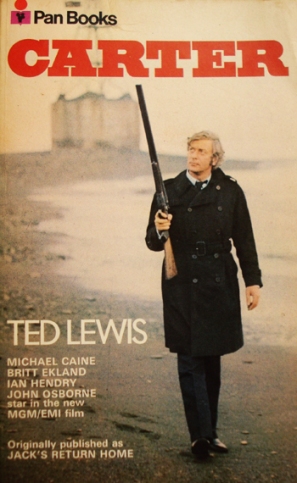 The centrepiece of Triplow’s book is, quite rightly, concerned with the novel itself, and its journey from a brutally honest and ground-breaking novel through to a partial re-imagining as one of the finest crime films ever made. Of Jack Carter, Triplow stresses that, despite the iconic image created by Michael Caine and director Mike Hodges
The centrepiece of Triplow’s book is, quite rightly, concerned with the novel itself, and its journey from a brutally honest and ground-breaking novel through to a partial re-imagining as one of the finest crime films ever made. Of Jack Carter, Triplow stresses that, despite the iconic image created by Michael Caine and director Mike Hodges
“it’s important to place him in context as Lewis originally intended. An ultra-real small town enforcer, violent, sadistic, irretrievably flawed, shouldering the burden of guilt; one of us maybe, if we dare to think it, taken a wrong turn, corrupted and unflinching.”
It would take a reader with a heart of stone and devoid of empathy to finish this book with anything other than a sense of sadness. The heartbreak is, of course, in our wisdom after the event, in our knowing that for Lewis the 1970s – the Get Carter years – were the apogee of his personal success and realisation that his immense talent had been recognised and rewarded, both financially and in terms of reputation.
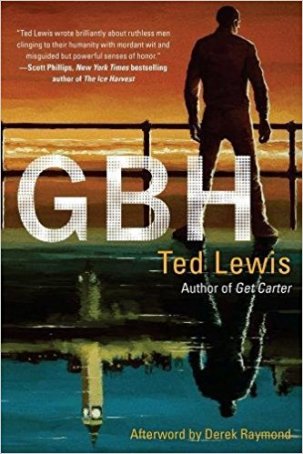 Aside from describing what must have been harrowing conversations with Lewis’s widow and children, Triplow employs both the depth and breadth of his knowledge of British crime fiction to convince us just how good Ted Lewis was. It is intriguing that Triplow, supported by no less an authority than the magisterial Derek Raymond, makes a fascinating case for GBH being the apotheosis of Lewis’s talent, despite the groundbreaking style and success of Jack’s Return Home. Getting Carter is a sober and sombre account of the life of a man whose talent both defined and destroyed him, and Triplow makes no attempt to sanitise his subject. Lewis was clearly a man of huge personal charm when not in the grip of drink, but from the early days of illegally bought pints of beer in the 1950s through to the grim years of decline and death, alcohol had him firmly by the throat.
Aside from describing what must have been harrowing conversations with Lewis’s widow and children, Triplow employs both the depth and breadth of his knowledge of British crime fiction to convince us just how good Ted Lewis was. It is intriguing that Triplow, supported by no less an authority than the magisterial Derek Raymond, makes a fascinating case for GBH being the apotheosis of Lewis’s talent, despite the groundbreaking style and success of Jack’s Return Home. Getting Carter is a sober and sombre account of the life of a man whose talent both defined and destroyed him, and Triplow makes no attempt to sanitise his subject. Lewis was clearly a man of huge personal charm when not in the grip of drink, but from the early days of illegally bought pints of beer in the 1950s through to the grim years of decline and death, alcohol had him firmly by the throat.
Anyone with more than a passing interest in the evolution of British crime fiction should read Getting Carter and celebrate the brilliance of the man at the centre of the story. It would be salutary, however, to keep Shelley’s words in mind:
“Look on my Works, ye Mighty, and despair!
Nothing beside remains. Round the decay
Of that colossal Wreck, boundless and bare
The lone and level sands stretch far away.”
Getting Carter is published by No Exit Press and is on sale now.
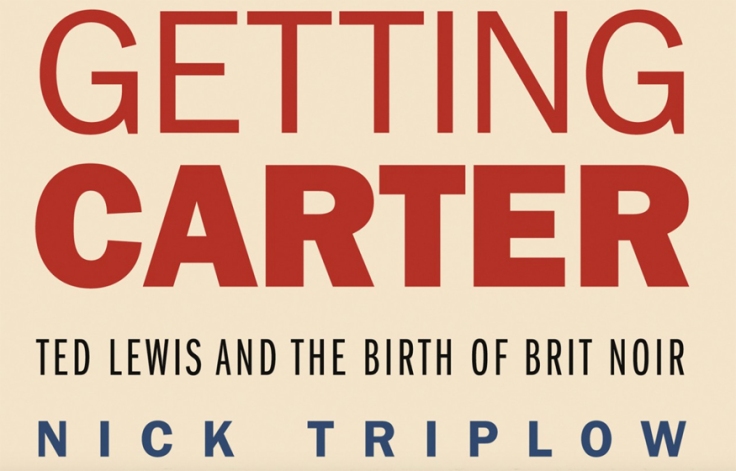


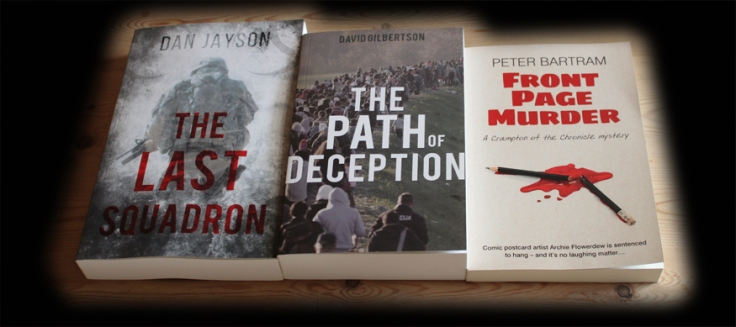
 The Last Squadron is a military thriller from debut author Dan Jayson, and it is set fifteen years from now, and the most pessimistic soothsayers have been proved right. The ethnic and religious schisms which had been festering for decades have bloomed into an apocalyptic hell of different wars across the globe. Nowhere is safe, and unlikely political alliances have been forged. A squadron of mountain troops has been serving on the inhospitable Northern Front, but as they fly home for much needed rest, their aircraft is shot down – and they realise that their nightmare is only just beginning. Dan Jayson’s bio tells us that he is the co-founder of an underwater search and salvage company. He is a Fellow of the Institute of Marine Engineers and served in the British Territorial Army. He is based in south-west London.The Last Squadron is published by Matador, and is
The Last Squadron is a military thriller from debut author Dan Jayson, and it is set fifteen years from now, and the most pessimistic soothsayers have been proved right. The ethnic and religious schisms which had been festering for decades have bloomed into an apocalyptic hell of different wars across the globe. Nowhere is safe, and unlikely political alliances have been forged. A squadron of mountain troops has been serving on the inhospitable Northern Front, but as they fly home for much needed rest, their aircraft is shot down – and they realise that their nightmare is only just beginning. Dan Jayson’s bio tells us that he is the co-founder of an underwater search and salvage company. He is a Fellow of the Institute of Marine Engineers and served in the British Territorial Army. He is based in south-west London.The Last Squadron is published by Matador, and is 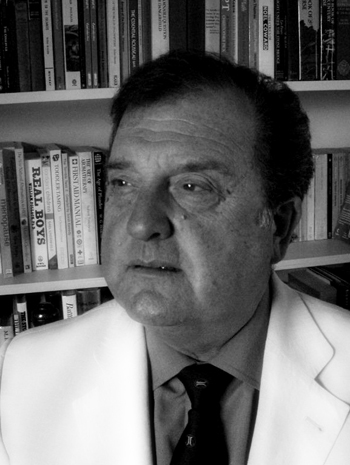 David Gilbertson (right) is a writer whose knowledge of policing and counter-terrorism is second to none. He had a long and varied career as a police officer. He served in uniform and CID in the UK and abroad, (attached to the New York City Police Department in 1988 and seconded to South Africa in 1994 as the Director of Peace Monitors for the first post-Apartheid elections). His latest novel, The Path of Deception, is set in a Britain devastated by a terrorist atrocity of hitherto unimagined scale. The police and security services are faced with the very real possibility that their attempts to prevent the outrage have been sabotaged from within. Suddenly, the task of making safe the imminent coronation of King Charles III is thrown into a very different focus. You can read more on the
David Gilbertson (right) is a writer whose knowledge of policing and counter-terrorism is second to none. He had a long and varied career as a police officer. He served in uniform and CID in the UK and abroad, (attached to the New York City Police Department in 1988 and seconded to South Africa in 1994 as the Director of Peace Monitors for the first post-Apartheid elections). His latest novel, The Path of Deception, is set in a Britain devastated by a terrorist atrocity of hitherto unimagined scale. The police and security services are faced with the very real possibility that their attempts to prevent the outrage have been sabotaged from within. Suddenly, the task of making safe the imminent coronation of King Charles III is thrown into a very different focus. You can read more on the 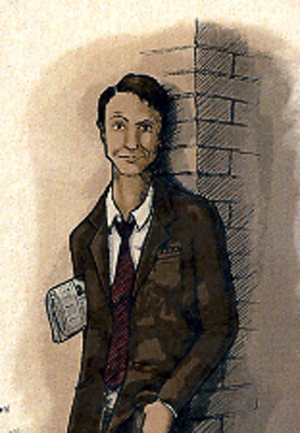 Crime reporter Colin Crampton (as imagined by Frank Duffy, left) is a delightful invention by journalist and author Peter Bartram. Only he could verify the extent to which Colin is autobiographical, but suffice it to say that Bartram has spent in his working life in journalism, and knows Brighton in and out, top to bottom, and backwards and forwards. In Front Page Murder, Crampton once again becomes involved in a very literal matter of life and death. Set in the 1960s before the abolition of the death penalty, Crampton is persuaded to establish the innocence of Archie Flowerdew – awaiting the hangman’s noose for the murder of a rival artist. Peter Bartram wrote an excellent piece for Fully Booked on the peculiarly English attraction known as What The Butler Saw machines, and you can read the entertaining feature
Crime reporter Colin Crampton (as imagined by Frank Duffy, left) is a delightful invention by journalist and author Peter Bartram. Only he could verify the extent to which Colin is autobiographical, but suffice it to say that Bartram has spent in his working life in journalism, and knows Brighton in and out, top to bottom, and backwards and forwards. In Front Page Murder, Crampton once again becomes involved in a very literal matter of life and death. Set in the 1960s before the abolition of the death penalty, Crampton is persuaded to establish the innocence of Archie Flowerdew – awaiting the hangman’s noose for the murder of a rival artist. Peter Bartram wrote an excellent piece for Fully Booked on the peculiarly English attraction known as What The Butler Saw machines, and you can read the entertaining feature 








